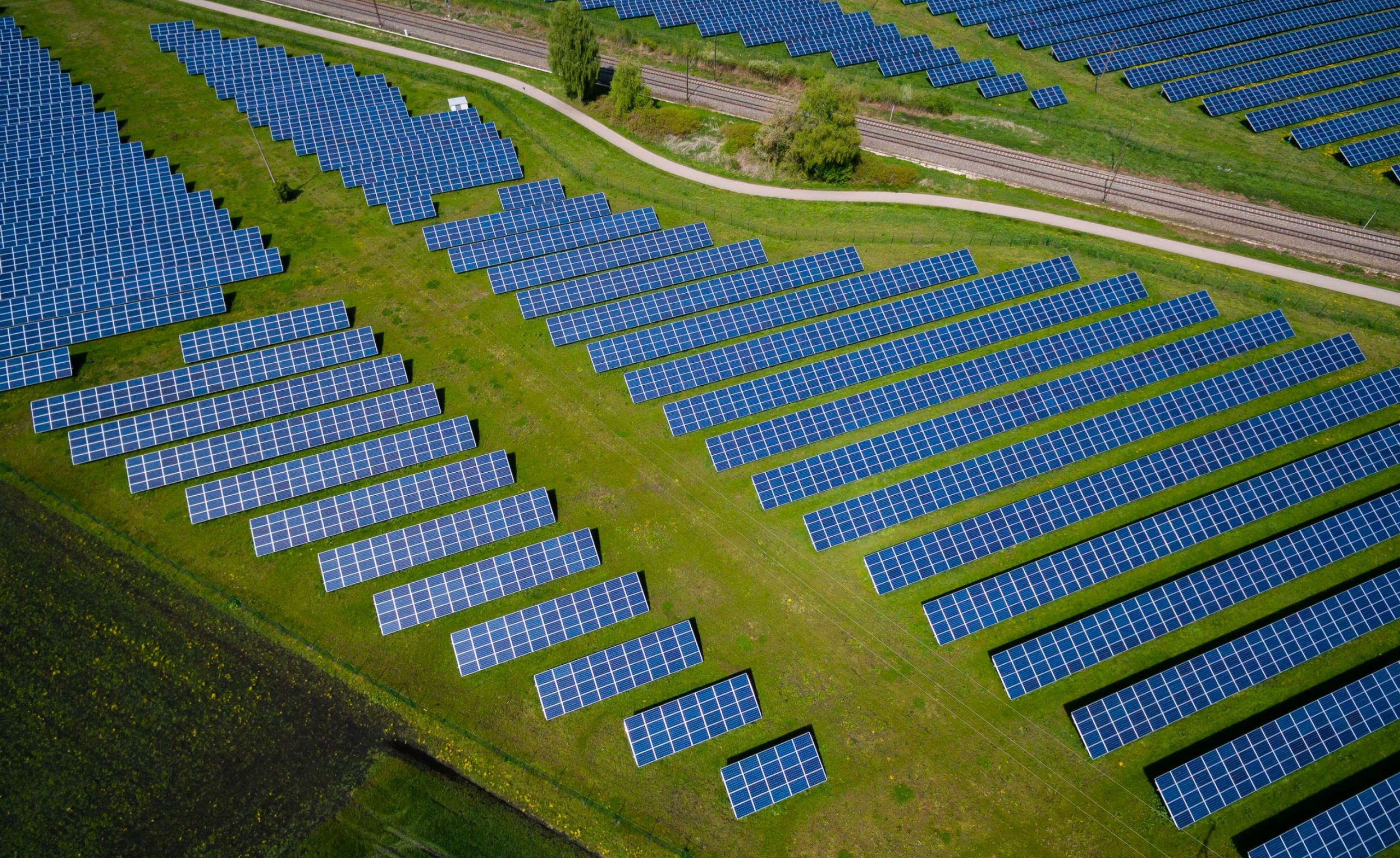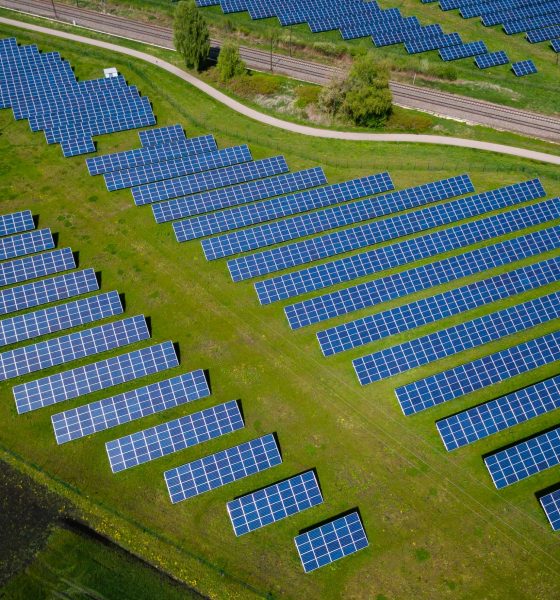Transitioning to renewable energy requires a multi-faceted approach, and power storage from sources such as solar and wind energy will play an increasingly important role in that playbook in the future. To tackle this problem, former Northvolt and Tesla workers have joined forces to focus on the scalability of battery production with the new company Peak Energy.
Peak Energy aims to mass-produce giant battery storage systems for renewable sources such as wind and solar (via CNBC). CEO and Founder Landon Mossburg formerly worked at Tesla and went on to work as an executive at Northvolt before founding Peak Energy earlier this year.
The company plans to scale a more affordable battery chemistry than the lithium-ion batteries used in Tesla’s Megapacks, instead hoping to produce large-scale battery systems with lower-density, lower-cost sodium-ion technology.
Since the company plans to mass-scale an existing product, Peak Energy President and COO Cameron Dales notes that they don’t consider the company a startup, although it only started in June. Interestingly, Peak Energy is looking to partner with a technology company specializing in battery tech, but specifically one that doesn’t yet have the ability to scale its products.
“A normal Silicon Valley startup is 10 years in the lab, come up with a better mousetrap and go to market. We’re completely the opposite,” Dales told CNBC in an interview.
The company plans to make individual sodium-ion battery cells, roughly the size of a loaf of bread, according to Dales. These cells will then be used together to make larger modules about the size of a filing cabinet. These filing cabinet modules could be deployed at solar or wind farms at volumes of 50-100 per order.
Credit: Peak Energy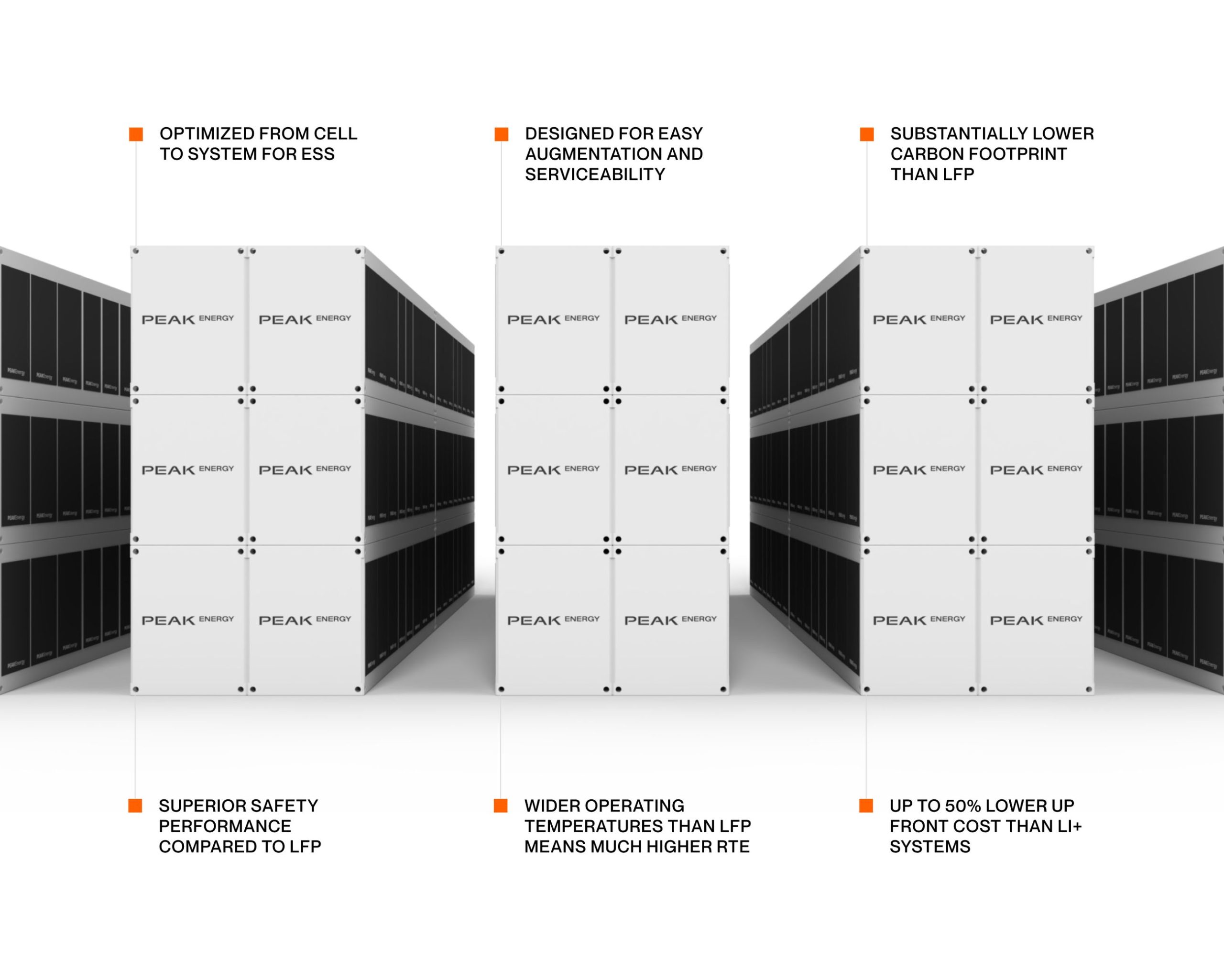
With 100 blocks, Mossburg explains, the battery system is expected to be able to power as many as 62,500 homes for up to four hours.
He also thinks that the company’s battery systems could cost around half the cost of a Tesla Megapack’s $1.3 million before installation, though it’s still too early for the company to have a price on its products.
“In the battery market it turns out the rarest commodity is not the technology — there are many excellent ideas out there at academic labs and startups — but rather the ability to scale to manufacturing,” Mossburg said. “The difficulty of manufacturing scale up is one of the reasons you see so many ‘breakthrough battery technology’ announcements but very very few companies who actually reach market.”
The company has also announced a $10 million funding round led by Eclipse Ventures’ Greg Reichow, a former Tesla executive who was in charge of battery, motor and electronics manufacturing before going on to lead global manufacturing. Crucially, Dales points out to CNBC that Reichow also led the development of Tesla’s Giga Nevada battery factory with partner Panasonic, which he considers the first mass-scale battery factory in the world.
TDK Ventures, owned by Japanese multinational electronics manufacturer TDK, will also join the funding round.
“The number one issue we face as it relates to expanding renewable energy sources is storage,” Reichow said. “This problem must be solved, but the existing approaches using lithium-ion and other technologies are not yet at a price point that enables the kind of scaling that society needs across sectors.”
The U.S. Energy Information Administration forecasts battery storage capacity to increase from just 9 gigawatts last year to as much as 49 GW by 2030 before jumping to 247 GW in 2050. This projection shows demand for mass-scale battery storage will continue to grow, especially as transportation and other sectors shift toward renewable energy sources.
Peak Energy currently hopes to produce “double digit gigawatt” amounts of battery cells by 2030, set to be used for its own battery systems and other applications. According to Mossburg, building a battery factory will take between $50 million and $100 million per GW. He also says a 30 GW factory would have between 2,000 and 3,000 workers, requiring a 1-2 million square-foot space.
Mossburg has experience scaling battery production at Northvolt, founded by former Tesla Global Head of Sourcing and Supply Chain Peter Carlsson, who worked for the automaker from 2011-2015. By the time Mossburg left Northvolt, the company had grown to employ 4,000 people from just 300 only 18 months prior.
″We’re running a playbook which I and the rest of the executive team initially demonstrated and deployed at Northvolt,” Mossburg said.
Tesla Megapack powers new 196 MWh battery storage system in Europe
What are your thoughts? Let me know at zach@teslarati.com, find me on X at @zacharyvisconti, or send your tips to us at tips@teslarati.com.

Elon Musk
Tesla Megapack powers $1.1B AI data center project in Brazil
By integrating Tesla’s Megapack systems, the facility will function not only as a major power consumer but also as a grid-supporting asset.
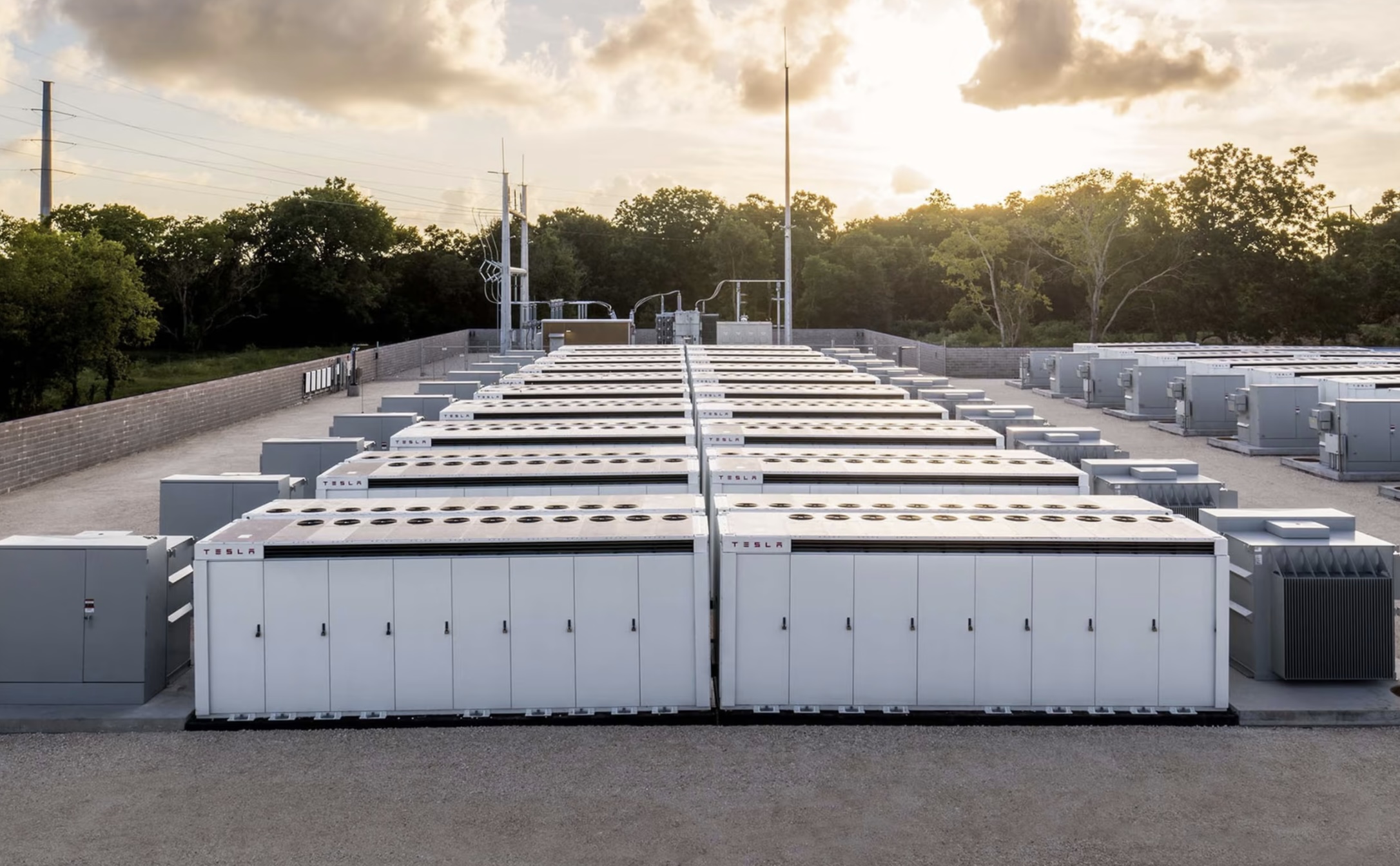
Tesla’s Megapack battery systems will be deployed as part of a 400MW AI data center campus in Uberlândia, Brazil. The initiative is described as one of Latin America’s largest AI infrastructure projects.
The project is being led by RT-One, which confirmed that the facility will integrate Tesla Megapack battery energy storage systems (BESS) as part of a broader industrial alliance that includes Hitachi Energy, Siemens, ABB, HIMOINSA, and Schneider Electric. The project is backed by more than R$6 billion (approximately $1.1 billion) in private capital.
According to RT-One, the data center is designed to operate on 100% renewable energy while also reinforcing regional grid stability.
“Brazil generates abundant energy, particularly from renewable sources such as solar and wind. However, high renewable penetration can create grid stability challenges,” RT-One President Fernando Palamone noted in a post on LinkedIn. “Managing this imbalance is one of the country’s growing infrastructure priorities.”
By integrating Tesla’s Megapack systems, the facility will function not only as a major power consumer but also as a grid-supporting asset.
“The facility will be capable of absorbing excess electricity when supply is high and providing stabilization services when the grid requires additional support. This approach enhances resilience, improves reliability, and contributes to a more efficient use of renewable generation,” Palamone added.
The model mirrors approaches used in energy-intensive regions such as California and Texas, where large battery systems help manage fluctuations tied to renewable energy generation.
The RT-One President recently visited Tesla’s Megafactory in Lathrop, California, where Megapacks are produced, as part of establishing the partnership. He thanked the Tesla team, including Marcel Dall Pai, Nicholas Reale, and Sean Jones, for supporting the collaboration in his LinkedIn post.
Elon Musk
Starlink powers Europe’s first satellite-to-phone service with O2 partnership
The service initially supports text messaging along with apps such as WhatsApp, Facebook Messenger, Google Maps and weather tools.
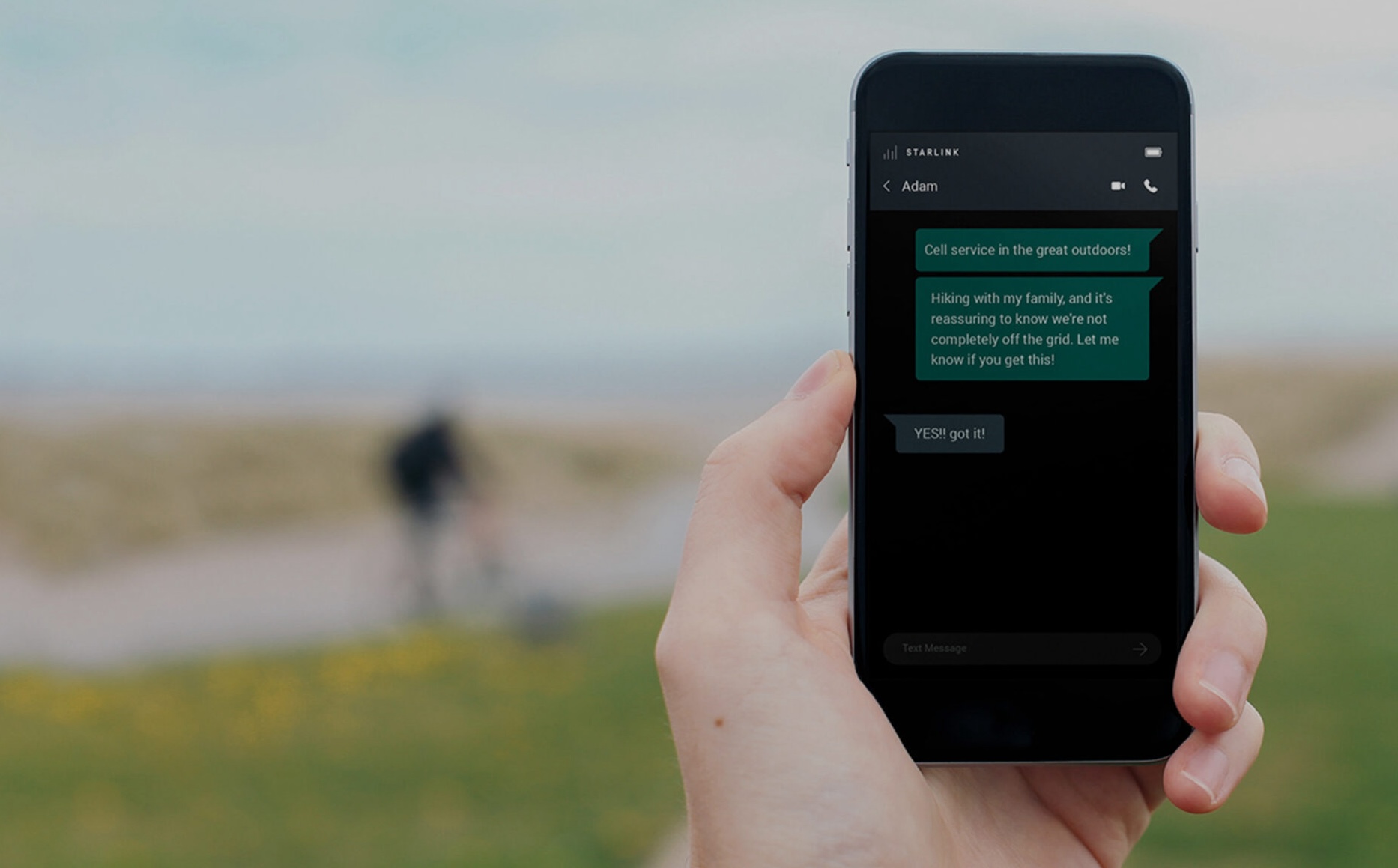
Starlink is now powering Europe’s first commercial satellite-to-smartphone service, as Virgin Media O2 launches a space-based mobile data offering across the UK.
The new O2 Satellite service uses Starlink’s low-Earth orbit network to connect regular smartphones in areas without terrestrial coverage, expanding O2’s reach from 89% to 95% of Britain’s landmass.
Under the rollout, compatible Samsung devices automatically connect to Starlink satellites when users move beyond traditional mobile coverage, according to Reuters.
The service initially supports text messaging along with apps such as WhatsApp, Facebook Messenger, Google Maps and weather tools. O2 is pricing the add-on at £3 per month.
By leveraging Starlink’s satellite infrastructure, O2 can deliver connectivity in remote and rural regions without building additional ground towers. The move represents another step in Starlink’s push beyond fixed broadband and into direct-to-device mobile services.
Virgin Media O2 chief executive Lutz Schuler shared his thoughts about the Starlink partnership. “By launching O2 Satellite, we’ve become the first operator in Europe to launch a space-based mobile data service that, overnight, has brought new mobile coverage to an area around two-thirds the size of Wales for the first time,” he said.
Satellite-based mobile connectivity is gaining traction globally. In the U.S., T-Mobile has launched a similar satellite-to-cell offering. Meanwhile, Vodafone has conducted satellite video call tests through its partnership with AST SpaceMobile last year.
For Starlink, the O2 agreement highlights how its network is increasingly being integrated into national telecom systems, enabling standard smartphones to connect directly to satellites without specialized hardware.
Elon Musk
Elon Musk’s Starbase, TX included in $84.6 million coastal funding round
The funds mark another step in the state’s ongoing beach restoration and resilience efforts along the Gulf Coast.
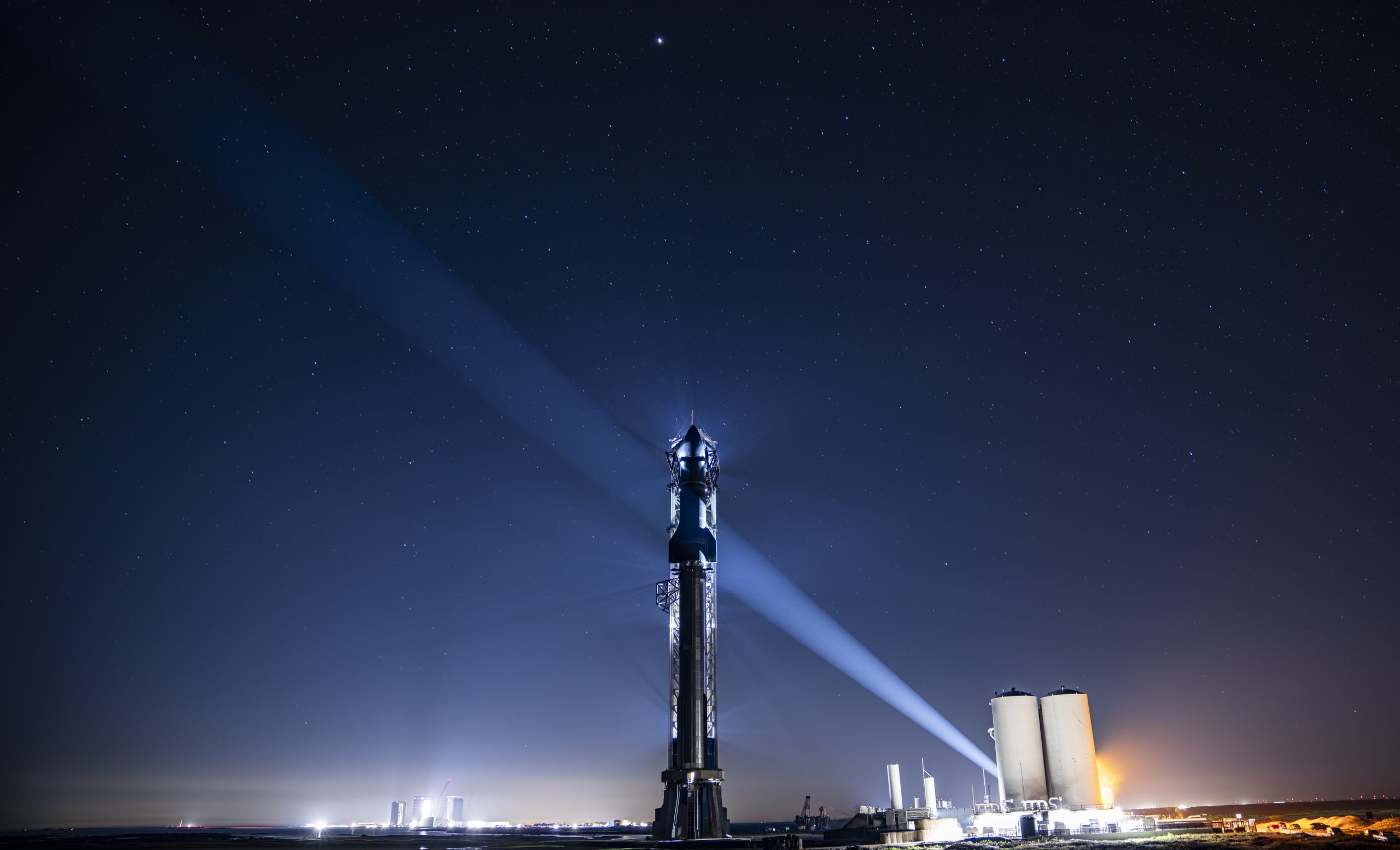
Elon Musk’s Starbase, Texas has been included in an $84.6 million coastal funding round announced by the Texas General Land Office (GLO). The funds mark another step in the state’s ongoing beach restoration and resilience efforts along the Gulf Coast.
Texas Land Commissioner Dawn Buckingham confirmed that 14 coastal counties will receive funding through the Coastal Management Program (CMP) Grant Cycle 31 and Coastal Erosion Planning and Response Act (CEPRA) program Cycle 14. Among the Brownsville-area recipients listed was the City of Starbase, which is home to SpaceX’s Starship factory.
“As someone who spent more than a decade living on the Texas coast, ensuring our communities, wildlife, and their habitats are safe and thriving is of utmost importance. I am honored to bring this much-needed funding to our coastal communities for these beneficial projects,” Commissioner Buckingham said in a press release.
“By dedicating this crucial assistance to these impactful projects, the GLO is ensuring our Texas coast will continue to thrive and remain resilient for generations to come.”
The official Starbase account acknowledged the support in a post on X, writing: “Coastal resilience takes teamwork. We appreciate @TXGLO and Commissioner Dawn Buckingham for their continued support of beach restoration projects in Starbase.”
The funding will support a range of coastal initiatives, including beach nourishment, dune restoration, shoreline stabilization, habitat restoration, and water quality improvements.
CMP projects are backed by funding from the National Oceanic and Atmospheric Administration and the Gulf of Mexico Energy Security Act, alongside local partner matches. CEPRA projects focus specifically on reducing coastal erosion and are funded through allocations from the Texas Legislature, the Texas Hotel Occupancy Tax, and GOMESA.
Checks were presented in Corpus Christi and Brownsville to counties, municipalities, universities, and conservation groups. In addition to Starbase, Brownsville-area recipients included Cameron County, the City of South Padre Island, Willacy County, and the Willacy County Navigation District.
